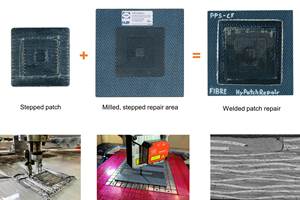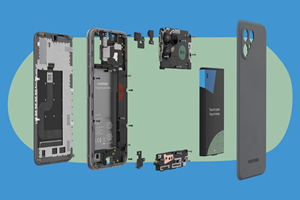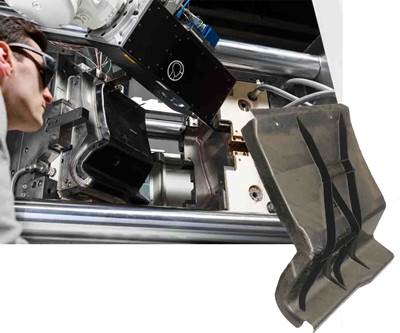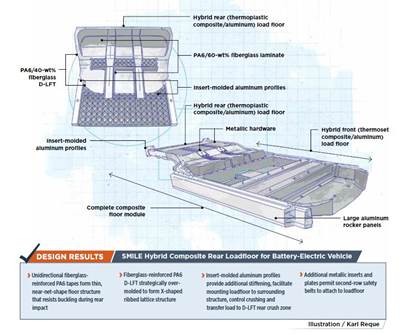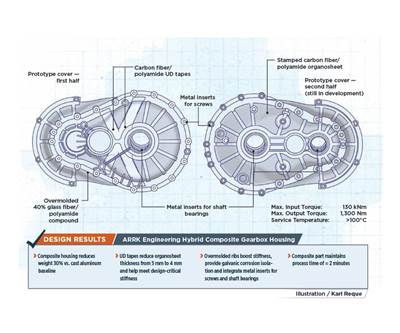EU project “ComMUnion” develops industrial process for hybrid metal and polymer-matrix composites
Laser textured steel is joined with continuous fiber-reinforced thermoplastic stiffeners using laser-assisted tape placement for joined structure without adhesives.
In recent years there has been a sharp increase in demand for lighter components for applications in mobility and transport in response to the need to save weight, and therefore energy and resources.
Hybrid components made of steel and locally functionalized with fiber-reinforced plastics combine high mechanical performance with low weight. Demand for manufacturing processes conducive to cost-effective mass-production of such structures is increasing rapidly. In the EU research project “ComMUnion”, the two Fraunhofer Institutes based in Aachen, Germany — Fraunhofer Institute for Production Technology (IPT) and Fraunhofer Institute for Laser Technology (ILT) — are working in collaboration with 14 partners from industry, research and academia, to develop industrial processes and solutions for hybrid lightweight design by combining metal and polymer-matrix composites for automotive and aerospace applications.
The new hybrid manufacturing process is based on a combination of laser texturing and laser-assisted tape placement. Components are first pre-processed using the laser to provide a specially developed, precisely defined, rough surface structure. The textured surface allows the continuous fiber-reinforced thermoplastic lightweight materials, which will later be used for stiffening, to be bonded directly to the steel component. The bond is then mechanical, eliminating any need for additional pre-treatment measures or additional adhesion promoters, such as adhesives or bonding agents.
The stiffening elements are made of fiber-reinforced thermoplastics, which are especially adapted to the expected loads and joined to the component using a tape placement process. The laser heats the thermoplastic tapes locally in the joining zone to the steel. The matrix material melts and flows into the laser textured cavities. After solidification of the melt material, the tape with the embedded unidirectional fibers adheres to the roughened surface of the steel part.
Combined process, suitable for mass production
The advantage of combining these two laser processes comes to the fore precisely when the mechanical properties of the component need to be improved locally without increasing the component’s weight significantly. The process is particularly suitable for mass production, as no further post-processing steps, such as curing operations, are required to consolidate the material after tape placement. Additionally, precision localized heating reduces distortion and residual stresses while joining the two materials. The laser texturing process, which has been developed at the Fraunhofer ILT, can also be applied in a reproducible way to the metal surface, precisely at the locations where the textures are needed. Additionally, the laser is not subject to any tool wear.
First hybrid car body part already finished as demonstrator component
The research partners have now finished a first demonstrator component made of high-strength steel and unidirectional fiber-reinforced thermoplastic tape in order to validate the applicability of the process in the form of a proof-of-concept: The two Fraunhofer researchers Kira van der Straeten from the Fraunhofer ILT and Tido Peters from the Fraunhofer IPT manufactured a hybrid lightweight rocker panel, a body component for the automotive industry, to test and prove the functionality of the process combination as part of the ComMUnion project.
The project partners presented the component to the professional visitors at the lightweight construction trade fair JEC World from 12 to 14 March 2019 in Paris on the “Composites in Action Area” organized by AZL.
The “ComMUnion” project is funded by the Horizon 2020 Research and Innovation Programme of the European Union under Grant Agreement No. 680567.
Part of a hybrid automotive rocker panel locally functionalized using laser-assisted tape placement. Source | ComMUnion Fraunhofer IPT
European partners of the ComMUnion research project
- Aciturri Engineering SL, Spain
- AFPT GmbH, Germany
- Aimen Technology Centre, Spain (coordinator)
- Autotech Engineering, AIE, part of the Gestamp Group, Spain
- CASP S.A., Greece
- ESI Group, France
- Fraunhofer Institute for Laser Technolgy ILT, Germany
- Fraunhofer Institute for Production Technology IPT, Germany
- Laboratory for Manufacturing Systems and Automation (LMS) – University of Patras, Greece
- Lunovu GmbH, Germany
- Missler Software, France
- Motofil Robotics, S.A., Portugal
- New Infrared Technologies SL, Spain
- Philips Photonics GmbH, Germany
- Tecnatom S.A., Spain
- Universidade de Coimbra, Portugal
For more information, contact:
kira.van.der.straeten@ilt.fraunhofer.de or malena.schulz@ipt.fraunhofer.de
This post is courtesy of the CompositesWorld and AZL Aachen GmbH media partnership.
Related Content
Combining multifunctional thermoplastic composites, additive manufacturing for next-gen airframe structures
The DOMMINIO project combines AFP with 3D printed gyroid cores, embedded SHM sensors and smart materials for induction-driven disassembly of parts at end of life.
Read MoreDeveloping repairs for thermoplastic composite aerostructures
HyPatchRepair project proves feasibility of automated process chain for welded thermoplastic composite patch repairs.
Read MoreComposites end markets: Electronics (2024)
Increasingly, prototype and production-ready smart devices featuring thermoplastic composite cases and other components provide lightweight, optimized sustainable alternatives to metal.
Read MoreJeep all-composite roof receivers achieve steel performance at low mass
Ultrashort carbon fiber/PPA replaces steel on rooftop brackets to hold Jeep soft tops, hardtops.
Read MoreRead Next
Thermoplastic overmolded thermosets, 2-minute cycle, one cell
Adhesive-free, functionalized hybrid composites enabled by industry-first, integrated molding cell.
Read MoreHybrid thermoplastics give load floor impact strength
Project leads to development of new compression process for selective application of D-LFT on UD tape laminates.
Read MoreProving performance in EV powertrains
Simulation-driven development replaces aluminum with thermoplastic composites in gearbox housing.
Read More

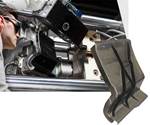
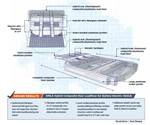
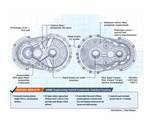













.jpg;maxWidth=300;quality=90)


